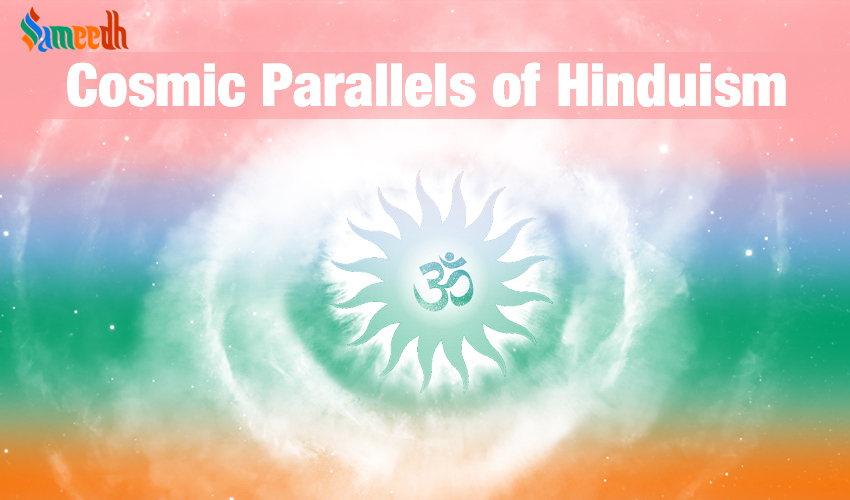The term “cosmos” refers to the entire universe, including both the visible and invisible realms. In Hinduism, the concept of cosmos is deeply intertwined with its religious and philosophical beliefs.

The term “cosmos” refers to the entire universe, including both the visible and invisible realms. It encompasses everything that exists, including galaxies, stars, planets, living beings, and various dimensions. In Hinduism, the concept of cosmos is deeply intertwined with its religious and philosophical beliefs.
- Creation and Order: Hinduism perceives the cosmos as a manifestation of divine intelligence and order. It is believed that the universe undergoes cycles of creation, preservation, and dissolution. The process of creation is attributed to the cosmic power of Brahma, while preservation is associated with Vishnu, and dissolution is attributed to Shiva. These cycles are seen as part of a grand cosmic design that maintains balance and order in the universe.
- Multidimensional Nature: Hinduism recognizes the existence of multiple dimensions and realms within the cosmos. The physical world that we perceive is just one aspect of reality. There are also subtle realms, heavenly abodes, and realms inhabited by various deities and celestial beings. These different dimensions are interconnected and influence each other, shaping the cosmic order.
- Deities and Cosmic Forces: Hinduism acknowledges the presence of numerous deities and cosmic forces that govern different aspects of the universe. These deities are considered cosmic powers with specific roles and responsibilities. For example, Saraswati is associated with knowledge, Lakshmi with wealth and abundance, and Indra with rain and thunder. These deities are revered and worshipped as manifestations of divine energy and play integral roles in the cosmic order.
- Karma and Cosmic Justice: Hinduism teaches the concept of karma, which is the law of cause and effect. It suggests that every action, whether positive or negative, generates consequences that shape an individual’s future experiences. The belief in karma is tied to the cosmic notion of justice, where actions are believed to have repercussions within the grand scheme of the cosmos.
- Interconnectedness: Hinduism emphasizes the interconnectedness of all beings and elements within the cosmos. It teaches that everything is interconnected and interdependent, and that the well-being of one is intricately linked to the well-being of all. This understanding fosters a sense of unity, compassion, and responsibility towards the environment and other living beings.
- Spiritual Path: Hinduism provides various spiritual paths, known as yogas, to help individuals realize their connection with the cosmos and the divine. These paths include karma yoga (the path of selfless action), bhakti yoga (the path of devotion), jnana yoga (the path of knowledge), and raja yoga (the path of meditation and mind control). Practicing these paths can lead to self-realization and a deeper understanding of one’s place in the cosmos.
Overall, in Hinduism, the cosmos is not merely a physical entity but a sacred and interconnected reality, governed by cosmic powers and imbued with spiritual significance. Understanding and aligning oneself with the cosmic order is seen as a means to attain spiritual growth, enlightenment, and ultimately liberation (moksha).